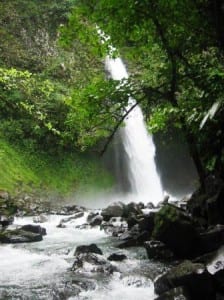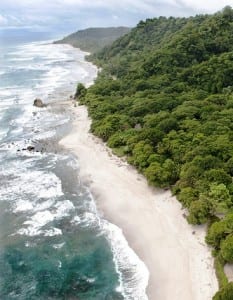It’s big business, this ecotourism.
It drives entire economies of countries like Kenya, Botswana, Belize, South Africa, Laos, and especially here in Costa Rica.
 Ecotourism is top of the list as to why millions of travelers from around the world come to Costa Rica’s tropical paradise each year to see its wondrous landscapes and exuberant biodiversity. Tourism is the number one industry in the country, and with good reason. Though a tiny Central American nation, Costa Rica is a “wonderland”of volcanoes, beaches, rainforest jungles, picturesque rivers and lakes, and rolling savannas.
Ecotourism is top of the list as to why millions of travelers from around the world come to Costa Rica’s tropical paradise each year to see its wondrous landscapes and exuberant biodiversity. Tourism is the number one industry in the country, and with good reason. Though a tiny Central American nation, Costa Rica is a “wonderland”of volcanoes, beaches, rainforest jungles, picturesque rivers and lakes, and rolling savannas.
Luckily, Costa Rica’s international reputation as “one of the most biologically diverse countries” has not only spurred ecotourism, but also has motivated the country’s government, local communities and private sectors to expand and better control the country’s protected areas, where logging, poaching and some agricultural activities were wreaking havoc on the environment.
The key element is that more and more tourists are now seeking to travel with a greater consciousness for ecological and social standards. “Responsible travelers and enlightened practices are transforming the $5 trillion global travel and tourism industry into an opportunity to empower people and protect the planet in the process,” according to National Geographic.
Ecotourism has become one of the fastest-growing sectors of the tourism industry, growing annually by 10–15% worldwide. Generally, ecotourism involves travel to destinations where flora, fauna, and cultural heritage are the primary attractions, and it aims to foster a greater appreciation of our natural habitats. An integral part of ecotourism is the promotion of recycling, energy efficiency, water conservation, and creation of economic opportunities for local communities.

Many ecotourism projects, however, are “eco” in name only and are not meeting established standards. And although many tourists use the “green” buzzword and claim to be environmentally concerned, they often don’t understand the ecological consequences of their visits and how their day-to-day activities physically impact the environment. They “rarely acknowledge how the meals they eat, the toilets they flush, the water they drink, etc.” affect the region’s economic and ecological systems.
That’s where sustainable tourism comes in. Sustainable tourism attempts to make as low impact on the environment and local culture as possible, while helping to generate future employment for local people. The goal of sustainable tourism is to create better places for people to live in and people to visit.
Tourists interested in sustainable practices can reduce their impact of traveling in many ways:
- Be informed about the culture, politics and economy of the places you’ll visit.
- Respect the way local cultures are, with no expectations or assumptions.
- Contribute to intercultural understanding and tolerance.
- Favor businesses which conserve cultural heritage and values.
- Support local businesses by purchasing local goods.
- Conserve resources by seeking out businesses that are environmentally conscious, and by using the least possible amount of non-renewable resources.
- Conserve electricity and water usage. Recycle. Reduce the amount of trash used.
At Pranamar Oceanfront Villas & Yoga Retreat, on Costa Rica’s stunning Santa Teresa Beach on the Nicoya Peninsula, sustainable tourism is a way of life. From the very beginning of creating Pranamar, owners Susan Money and Greg Mullins have been committed to “creating a special place that focuses on community, consciousness and honoring nature’s gifts.” They believe it is “important to consider the imprint we leave and the effects we have on our environment and planet.”
The luxury hotel uses a completely independent septic system that recycles treated water into the irrigation of its gardens. All waste water passes through a three-tank aerobic system using natural bacteria to clean the water, and then enters a drip irrigation system in the gardens which maximizes water usage. The local municipality is showing off Pranamar’s unique water system as an example for other tourism businesses and private property owners to implement.

Pranamar’s lush tropical gardens are completely organic; they use no herbicides or pesticides on the property. Much of the verdant vegetation is “edible,” meaning fruits, vegetables and herbs that supply the restaurant with its delicious, fresh and healthy cuisine. Fruit trees around the hotel’s property include mango, papaya, banana, starfruit, guanabana, passion fruit and Suriname cherries. During the dry season, they plant melons and squashes underneath ornamental and fruit trees as ground cover to help hold moisture. The herb and vegetable garden grows mint, basil, oregano, rosemary, thyme, tarragon, turmeric, arugula, mustard greens, tomatoes, chili peppers, okra, cucumber and eggplant. The hotel’s composting systemcompletes the food cycle by turning the restaurant’s organic waste into natural fertilizer.
Sustainability continues to the hotel’s use of only biodegradable soaps, laundry detergent, cleaning supplies, and even guests’ amenity shampoos, conditioners and bath soaps. The beautiful free-form swimming pool holds salt water and is chemical-free.
 Energy-saving light bulbs and appliances reduce electricity usage.
Energy-saving light bulbs and appliances reduce electricity usage.
Sustainable tourism extends as well to Pranamar’s community practices. Hotel personnel are locals from the community, and the hotel donates 10% of its yoga class profits to local schools and community organizations. Plus, the hotel offers a monthly donation-only yoga class in Spanish for area residents.
On a greater scale, Pranamar staff work with the community on monthly beach clean-ups. Along with other hotels and businesses in the area, the beach communities of Santa Teresa, Mal Pais, Carmen and Hermosa all obtained for 2012 the highly-desired ecological Blue Flag award, which ensures the quality and sanitation of the water, beach clean-up projects, community informational signs, and environmental education.
In the future, Pranamar hopes to offer its guests biodegradable water bottles that can be refilled with filtered water available throughout the hotel, and to decrease and eventually eliminate selling plastic water bottles in at the hotel all together.
by Shannon

Comments
I wonder if it's too late. Have so many large hotels already been built in Costa Rica that the country won't be able to continue its campaign for sustainable tourism?
After 14 years of helping travelers find eco-friendly hotels to stay in Costa Rica, I'm glad that sustainable tourism is going mainstream. Although in the short term the costs of retrofitting a waste treatment systems or installing recycling bins may be expensive, in the long term you preserve the natural setting which is the main draw for the country, thereby helping them earn more in the long term. To further my participation in this effort to promote those businesses trying to lessen their negative impact on the environment, CR Surf Travel Company is now a Benefit Corporation in California. That means sustainability is written into our mission statement and every business objective. To find out more about it, visit - http://www.crsurf.com/aboutus.html
Thanks! We agree. The country has its economic issues like everywhere, but there is a huge movement in both the private and public sectors to preserve the environment, reforest with native trees, clean up the rivers and beaches, and live up to its ecotourism fame. Trip Advisor named Costa Rica #1 eco-friendly destination in the world in April 2012!
Glad you posted this. I was fortunate enough to attend the Sustainable Tourism conference in San Jose in 2010; very inspiring. It's hard to name any country that's more tuned in to ecotourism than Costa Rica. Let's hope the public and private sector there keep their eyes on the prize.